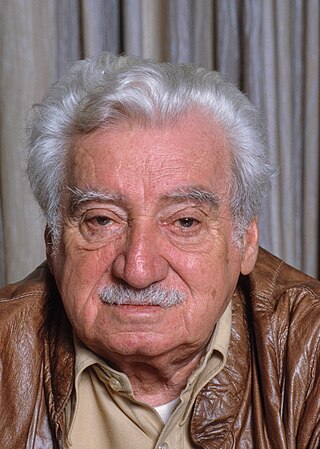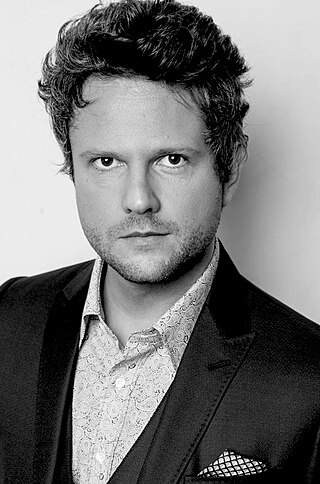A list of films produced in Brazil in 2001 (see 2001 in film). Brazil produced 30 films in 2001. [1]
A list of films produced in Brazil in 2001 (see 2001 in film). Brazil produced 30 films in 2001. [1]

Maria do Carmo Miranda da Cunha, known professionally as Carmen Miranda, was a Portuguese-born Brazilian singer, dancer, and actress. Nicknamed "The Brazilian Bombshell", she was known for her signature fruit hat outfit that she wore in her American films.

The culture of Brazil has been shaped by the amalgamation of diverse indigenous cultures, and the cultural fusion that took place among Indigenous communities, Portuguese colonizers, and Africans, primarily during the Brazilian colonial period. In the late 19th and early 20th centuries, Brazil received a significant number of immigrants, primarily of Portuguese, Italian, Spanish, and German origin, which along with smaller numbers of Austrians, Arabs, Japanese, Poles, Ukrainians, Russians, Greeks, Chinese, and Koreans gave a relevant contribution to the formation of regional cultures in Brazil, and thus contributed to its current existence as a plural and racially diverse society.

Jorge Amado was a Brazilian writer of the modernist school. He remains the best-known of modern Brazilian writers, with his work having been translated into some 49 languages and popularized in film, including Dona Flor and Her Two Husbands in 1976. His work reflects the image of a Mestiço Brazil and is marked by religious syncretism. He depicted a cheerful and optimistic country that was beset, at the same time, with deep social and economic differences.

Fernando Ferreira Meirelles is a Brazilian film director, producer and screenwriter. He is best known for co-directing the film City of God, released in 2002 in Brazil and in 2003 in the U.S. by Miramax Films, which received international critical acclaim. For his work in the film, he was nominated for an Academy Award for Best Director. He was also nominated for a Golden Globe Award for Best Director in 2005 for The Constant Gardener, which garnered the Academy Award for Best Supporting Actress for Rachel Weisz. He also directed the 2008 adaptation of José Saramago's novel Blindness, and the 2011 film 360. In 2019, Meirelles directed The Two Popes for Netflix.

Walter Moreira Salles Júnior is a Brazilian filmmaker, most known for his Golden Bear winning film Central Station.

Behind the Sun is a 2001 social drama film directed by Walter Salles, produced by Arthur Cohn, and starring Rodrigo Santoro. Its original Portuguese title means Shattered April, and it is based on the 1978 novel Broken April written by the Albanian writer Ismail Kadare, about the honor culture in the North of Albania.

Strand Releasing is an American film production company founded in 1989 and is based in Culver City, California. The company has distributed over 300 auteur-driven titles from acclaimed international and American directors such as Apichatpong Weerasethakul, Gregg Araki, François Ozon, Jean-Luc Godard, Catherine Breillat, Claire Denis, Fatih Akin, Aki Kaurismäki, Claude Miller, Manoel de Oliveira, Gaspar Noé, André Téchiné and Terence Davies.

Selton Figueiredo Mello is a Brazilian actor, voice actor, screenwriter, producer, editor and director. Since his childhood, he acted on TV shows. Now he works on TV, movies and theater. Throughout his career, he developed a strong and solid experience in cinema, producing and directing movies and videoclips, and being publicly and critically acclaimed for it. The actor hosted Tarja Preta, a TV show about culture and independent movies, from 2004 until 2008.

Fox Sports is the brand name for a number of sports channels, broadcast divisions, programming, and other media around the world. The name originates from the Fox Broadcasting Company in the United States, which in turn derives its name from Fox Film, named after founder William Fox.
Pornochanchada is the name given to a genre of sex comedy films produced in Brazil that was popular from the late 1960s after popularity of commedia sexy all'italiana. By the 1980s, with the wide availability of hardcore pornography through clandestine video cassettes, the genre suffered a considerable decline. The name, combined pornô (porn) and chanchada, which itself combined comedy and erotica.
Latin American cinema refers collectively to the film output and film industries of Latin America. Latin American film is both rich and diverse, but the main centers of production have been Argentina, Brazil and Mexico. Latin American cinema flourished after the introduction of sound, which added a linguistic barrier to the export of Hollywood film south of the border.

Eduardo de Oliveira Coutinho was a Brazilian film director, screen writer, actor and film producer, known as one of the most important documentarists in Brazil.

José Bastos Padilha Neto is a Brazilian film director, producer and screenwriter. He is best known for directing the Brazilian critical and financial successes Elite Squad and Elite Squad: The Enemy Within and the 2014 remake of RoboCop. He has won the Golden Bear at the Berlin International Film Festival for Elite Squad in 2008. He is also the producer of the Netflix original series Narcos, starring frequent collaborator Wagner Moura, and directed the first two episodes in the series.

Amácio Mazzaropi was a Brazilian actor and filmmaker.

Disney Channel is a Latin American pay television network broadcasting throughout Hispanic America and Brazil. It was officially version of the eponymous television channel in the United States launched on July 27, 2000 as a premium-label channel in Hispanic America, and also in Brazil back on April 5, 2001, and became a basic pay TV network in 2004.
Joel Zito Araújo is a Brazilian film director, writer and producer of films and TV programs. Since 1984, Araújo has produced one feature film, two short films and 25 documentaries. Some of these works have won prizes or been selected for screenings at film festivals throughout the world. From 2006 to 2007, Araújo was president of the Brazilian Filmmakers Association. He received his Ph.D. in Communication Sciences from the Escola de Comunicações e Artes at the University of São Paulo in 1999. He was postdoctoral fellow and visiting professor in the Departments of Radio, TV, and Film and Anthropology as well as the Center for African & African-American Studies at the University of Texas at Austin from August 2001 to May 2002.

Andrew "Andrucha" Waddington is a Brazilian film director, producer, and screenwriter.
The history of Brazilian animation is relatively recent. In the first half of the 20th century, there were some small experiments produced in animation without much continuity, to the emergence of several animated films in the other half of the century. The 21st century saw the advent of many animated series for television.